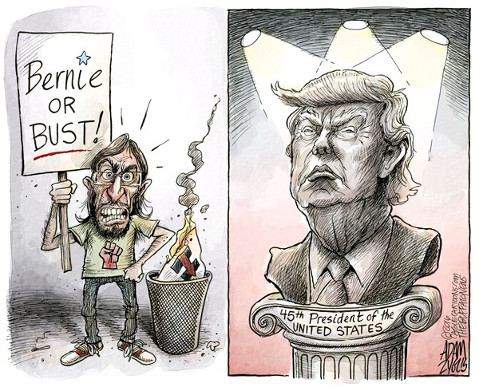A Tea Party of the Left?
Struggle for Sanders Raising Zealotry, Anger, Incivility

Sanders supporter to thunderous approval at rally in New York: “Medicare for all will not happen if we keep electing corporate Democratic whores … After we elect Bernie, we need to replace the corporatist Democrats with Berniecrats.”
News item: Bernie Sanders says he is leading a “political revolution” and that the Democratic nomination contest is a “struggle for the soul of the party.”
News item: Sanders endorses primary opponent of DNC Chair Debbie Wasserman Schultz and says he will oust her as chair if he is nominated.
News item: Sanders supporters shout down and boo Senator Barbara Boxer as she pleads, “Bernie wants you to be civil.” Nevada Democratic Party Chair Roberta Lange unplugs phone after receiving dozens of threatening messages, including death threats.
Journalist Jacques Mallet du Pan on French politics in the 1790s: “The Revolution devours its children.”
Since the emergence of the Tea Party in 2010, progressives have watched the ensuing fratricidal warfare among conservatives with both shock and bemusement. A movement born of a backlash against the policies of a liberal president soon shifted its focus to Republicans who were not sufficiently pure of conservative heart. The first targets were alleged RINOs (Republican in Name Only) like Pennsylvania Senator Arlen Specter, who was tarred and feathered at a town hall on Obamacare in 2010. Then, establishment Republicans like John Boehner were labeled Obama enablers and sellouts. Later still, even hard-line conservatives like Eric Cantor, who had stoked the anger of the movement with the expectation that it could be redirected against Democrats, were in the movement’s cross-hairs. Despite his solid conservative credentials, he had dared to compromise and broker deals with Democrats, a mortal sin. When a Tea Party challenger unseated Cantor in a primary, analysts dusted off the Mallet du Pan quote. The Tea Party was indeed devouring its children.
When political movements cross a threshold point of zealotry, they assume the characteristics of a religious war. In such wars there are two enemies. The most apparent foes are the infidels, who have never believed what the zealots believe. But a greater threat is posed by the heretics, who once embraced the true faith but have abandoned it or claim to adhere to the faith but actually worship false gods. The infidels cannot be defeated until the heretics are purged from the ranks of the righteous. When the Tea Party movement reached this threshold of zealotry, it was predictable that its pitchforks would be wielded against perceived apostate conservatives. Ultimately the movement’s anger and sense of victimization and betrayal set the stage for the rise of Trump.
Progressives observing this fratricide from afar have falsely assumed that “it can’t happen here,” that the left could never descend into this sort of internecine fight. But it is possible that we are witnessing the early stages of the emergence of a Tea Party of the left. A hard core of Sanders supporters is displaying the same zealotry, the same disdain for compromise, the same anger, and the same incivility that characterized the early Tea Party movement. Like the Tea Partiers, they feel victimized by a rigged system. And like their brethren on the right, they have begun targeting apostates in their midst.
Factional conflict within a political party is both inevitable and essential. Vigorous debate over the identity of a party is critical to its evolution as it adjusts to changing times and changing issues. The Democratic Party has a long history of robust disagreements over its platform and the candidates who should represent it. A century ago Will Rogers observed, “I am not a member of any organized political party, I am a Democrat.” But what we are witnessing now, as some of the Bernie Bros sharpen their pitchforks, poses a risk of producing the greatest schism in the party since the 1968 election at the height of the Vietnam War, a schism that aided the election of Richard Nixon.
For some Sanders supporters the nomination contest has devolved into caricature: Obi-Wan Kenobi vs. Cruella De Vil. As commentator Charles Krauthammer recently noted, “Hillary Clinton has more baggage than American Airlines.” That baggage, which includes the Iraq War Resolution vote and Wall Street ties, is fair game in the campaign. But the purity test that Barney Or Bust supporters demand is one that Democrats with long track records of supporting progressive causes could not pass. Clinton had one of the most liberal voting records in the Senate during her tenure there, a record more liberal than Barack Obama’s. If Clinton fails the Bernie Purity Test, then Obama should be pilloried as well. After all, he took Wall Street money, was supported by Super PAC money, and won the nomination through the same “rigged system.” Same story for Barbara Boxer, Dianne Feinstein, Joe Biden, and so on.
The destruction wrought by the Tea Party movement should be a cautionary tale for progressives about the consequences of zealots making war on their own side. It can happen here. If the hard core of Sanders supporters continue to search out heretics, observers at the Democratic Convention in Philadelphia in July may be invoking Jacques Mallet du Pan yet again. And that can only work to the benefit of Donald Trump.



